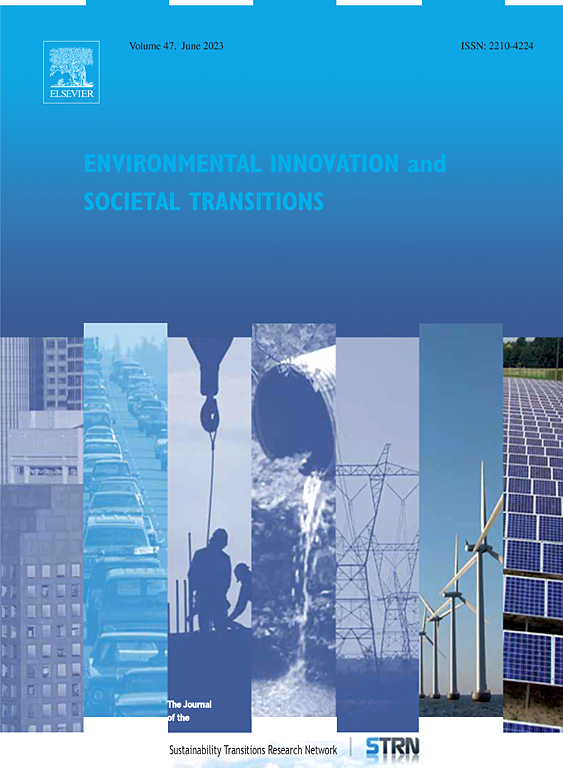网络化可持续商业模式创新与可持续能源转型:2010-2022年中国现有制造商案例研究
IF 5.7
2区 经济学
Q1 ENVIRONMENTAL SCIENCES
Environmental Innovation and Societal Transitions
Pub Date : 2024-09-22
DOI:10.1016/j.eist.2024.100911
引用次数: 0
摘要
可持续转型文献很少关注构成电力系统补充要素的现有发电设备制造商。为了填补这一研究空白,本研究提出了网络化可持续商业模式创新(SBMI)的概念,并将其作为一个分析框架,以探讨现有制造商如何根据现有发电设备制造商的变化改变商业模式,以及这些变化如何影响电力系统的转型。基于对中国三大在位发电设备制造商的案例研究,我们的发现揭示了在位发电商和发电设备制造商的网络化 SBMI 能够在在位发电设备制造商有能力调整方向并获得市场竞争优势的细分市场中加速向基于可再生能源的电力系统转型。然而,除非現有的發電設備製造商完全取消煤電設備的生產能力,否 則現有發電商仍可恢復煤電項目。本文章由计算机程序翻译,如有差异,请以英文原文为准。
Networked sustainable business model innovation and sustainable energy transitions: A case study of incumbent Chinese manufacturers in 2010–2022
The sustainability transition literature has paid scant attention to incumbent generation equipment manufacturers, constituting a complementary element in electricity systems. To fill this research gap, this study develops the concept of networked sustainable business model innovation (SBMI) as an analytical framework to explore how incumbent manufacturers change business models in response to changes in incumbent power generators and how these changes influence transitions in electricity systems. Based on case studies of three major Chinese incumbent power generation equipment manufacturers, our findings reveal that the networked SBMI by incumbent power generators and power generation equipment manufacturers can accelerate transitions to RES-E-based electricity systems in the segments where incumbent power generation equipment manufacturers have the capabilities to reorient and gain a competitive edge in the market. However, incumbent power generators can resume coal power projects unless incumbent power generation equipment manufacturers completely scrap coal power equipment production capacities.
求助全文
通过发布文献求助,成功后即可免费获取论文全文。
去求助
来源期刊

Environmental Innovation and Societal Transitions
Energy-Renewable Energy, Sustainability and the Environment
CiteScore
13.60
自引率
19.40%
发文量
90
审稿时长
56 days
期刊介绍:
Environmental Innovation and Societal Transitions serves as a platform for reporting studies on innovations and socio-economic transitions aimed at fostering an environmentally sustainable economy, thereby addressing structural resource scarcity and environmental challenges, particularly those associated with fossil energy use and climate change. The journal focuses on various forms of innovation, including technological, organizational, economic, institutional, and political, as well as economy-wide and sectoral changes in areas such as energy, transport, agriculture, and water management. It endeavors to tackle complex questions concerning social, economic, behavioral-psychological, and political barriers and opportunities, along with their intricate interactions. With a multidisciplinary approach and methodological openness, the journal welcomes contributions from a wide array of disciplines within the social, environmental, and innovation sciences.
 求助内容:
求助内容: 应助结果提醒方式:
应助结果提醒方式:


